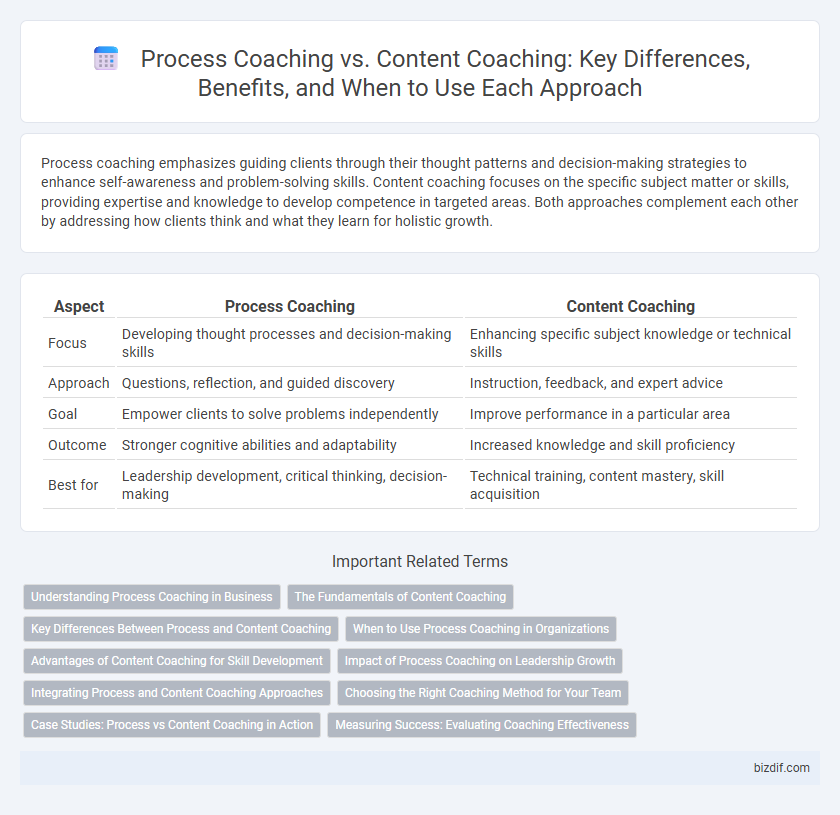Process coaching emphasizes guiding clients through their thought patterns and decision-making strategies to enhance self-awareness and problem-solving skills. Content coaching focuses on the specific subject matter or skills, providing expertise and knowledge to develop competence in targeted areas. Both approaches complement each other by addressing how clients think and what they learn for holistic growth.
Table of Comparison
| Aspect | Process Coaching | Content Coaching |
|---|---|---|
| Focus | Developing thought processes and decision-making skills | Enhancing specific subject knowledge or technical skills |
| Approach | Questions, reflection, and guided discovery | Instruction, feedback, and expert advice |
| Goal | Empower clients to solve problems independently | Improve performance in a particular area |
| Outcome | Stronger cognitive abilities and adaptability | Increased knowledge and skill proficiency |
| Best for | Leadership development, critical thinking, decision-making | Technical training, content mastery, skill acquisition |
Understanding Process Coaching in Business
Process coaching in business emphasizes guiding clients to improve their thinking, decision-making, and problem-solving skills rather than delivering specific content or expertise. It fosters self-awareness and accountability by helping individuals recognize patterns, set goals, and develop strategies tailored to their unique challenges. This approach enhances leadership effectiveness and drives sustainable organizational growth through continuous learning and adaptive change.
The Fundamentals of Content Coaching
Content coaching emphasizes mastering the fundamentals of specific skills, knowledge, and subject matter to enhance performance and expertise. It involves targeted guidance on practical application, technical accuracy, and continual improvement within a defined area. Effective content coaching drives measurable outcomes by aligning learning goals with business objectives and individual development plans.
Key Differences Between Process and Content Coaching
Process coaching emphasizes developing clients' thinking, decision-making, and reflection skills to enhance self-awareness and problem-solving abilities. Content coaching focuses on specific knowledge, skills, or tasks related to the client's goals, providing expert guidance and practical information. The key difference lies in process coaching fostering independent growth through questioning strategies, while content coaching delivers direct advice and technical support.
When to Use Process Coaching in Organizations
Process coaching is most effective in organizations aiming to enhance team dynamics, improve problem-solving skills, and foster leadership development by guiding individuals through structured thinking and decision-making frameworks. It suits situations where employees face complex challenges requiring behavioral shifts rather than technical knowledge acquisition. Use process coaching to cultivate self-awareness, adaptability, and collaborative skills essential for sustainable organizational growth.
Advantages of Content Coaching for Skill Development
Content coaching accelerates skill development by providing targeted expertise and specific knowledge that directly addresses learners' needs. It facilitates practical application and mastery of skills through structured guidance and detailed feedback. This focused approach enhances competency more effectively than process coaching, which concentrates on overall thinking and problem-solving methods.
Impact of Process Coaching on Leadership Growth
Process coaching enhances leadership growth by focusing on the development of critical thinking, decision-making, and emotional intelligence rather than simply delivering knowledge or solutions. This coaching method empowers leaders to navigate complex challenges independently, leading to sustained personal and professional development. Studies show that leaders engaged in process coaching exhibit higher adaptability and improved team performance compared to those receiving content-focused coaching.
Integrating Process and Content Coaching Approaches
Integrating process and content coaching approaches enhances client development by blending the exploration of underlying thought patterns with targeted knowledge acquisition. This combined method enables coaches to address both the "how" of thinking and the "what" of subject matter, fostering deeper self-awareness and applied learning. Effective integration tailors coaching to individual needs, driving sustainable behavior change and skill mastery.
Choosing the Right Coaching Method for Your Team
Process coaching emphasizes enhancing a team's communication, decision-making, and problem-solving skills to improve effectiveness and collaboration. Content coaching targets specific knowledge, skills, or tasks related to the team's goals or projects, driving performance through expertise development. Selecting the appropriate coaching method depends on identifying whether the team requires support with interpersonal dynamics and workflows (process coaching) or technical proficiency and task execution (content coaching).
Case Studies: Process vs Content Coaching in Action
Case studies reveal that process coaching emphasizes guiding clients through self-discovery and problem-solving techniques, enhancing their decision-making skills and long-term growth. Content coaching focuses on imparting specific knowledge or skills related to the client's field, resulting in immediate performance improvement and expertise development. Analysis of diverse case studies highlights that combining both approaches often yields comprehensive benefits, balancing skill acquisition with personal development.
Measuring Success: Evaluating Coaching Effectiveness
Measuring success in process coaching centers on tracking client progress through self-awareness, decision-making improvements, and behavioral changes, often using qualitative feedback and goal attainment scaling. Content coaching evaluates effectiveness by assessing the acquisition and application of specific skills or knowledge, typically measured through performance metrics and competency assessments. Combining both approaches provides a comprehensive evaluation of coaching impact, balancing personal growth with tangible skill development.
Process Coaching vs Content Coaching Infographic

 bizdif.com
bizdif.com